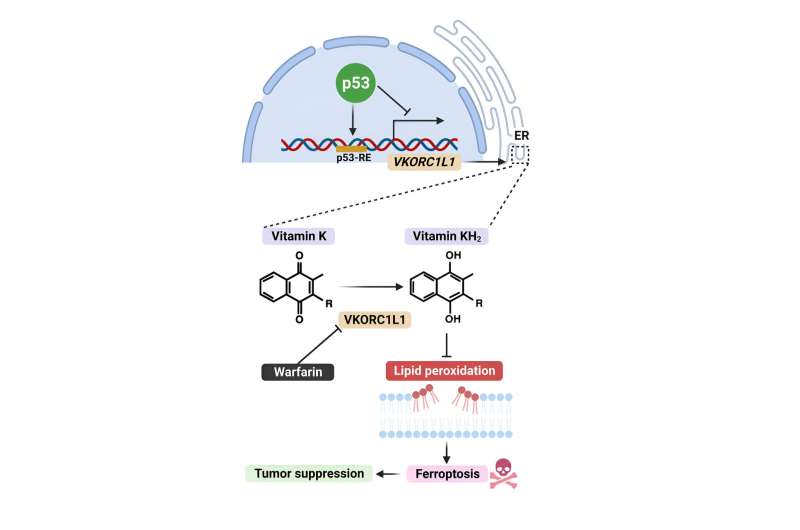This article has been reviewed according to Science X's editorial process and policies. Editors have highlighted the following attributes while ensuring the content's credibility:
fact-checked
peer-reviewed publication
trusted source
proofread
Common blood thinner may double as cancer therapy

Warfarin, a widely used blood thinner, appears to have potent anti-cancer properties, according to a study by Columbia University researchers. The study, conducted in human cells and in mice, found that warfarin stops tumors from interfering with a self-destruct mechanism that cells initiate when they detect mutations or other abnormalities.
"Our findings suggest that warfarin, which is already approved by the FDA, could be repurposed to treat a variety of cancers, including pancreatic cancer," says study leader Wei Gu, Ph.D., the Abraham and Mildred Goldstein Professor of Pathology & Cell Biology (in the Institute for Cancer Genetics) at Columbia University Vagelos College of Physicians and Surgeons.
The study is titled "Regulation of VKORC1L1 is critical for p53-mediated tumor suppression through vitamin K metabolism," and it was published July 18 in Cell Metabolism. Postdoctoral researcher scientists Xin Yang, Ph.D., and Zhe Wang, Ph.D., contributed equally as first authors.
Death by ferroptosis
The warfarin discovery was an unexpected finding from a study designed to uncover molecular processes that regulate ferroptosis, a cell death mechanism recently discovered by Columbia chemist Brent Stockwell, Ph.D., associate professor in the Departments of Biological Sciences and Chemistry, and other scientists.
Cancer researchers are excited by the idea of harnessing ferroptosis—so-named because it requires iron to work—to kill cancer cells. Drugs that induce ferroptosis may be particularly useful for cancers that elude current treatments.
To learn more about how ferroptosis is controlled in the cell, Gu, Stockwell, and their colleagues performed genetic screens on human melanoma cells to identify genes that contribute to ferroptosis. As expected, the screens identified several previously known ferroptosis genes, but a new one stood out: VKORC1L1.
In laboratory experiments, the researchers found that VKORC1L1 is a potent inhibitor of ferroptosis, and loss of VKORC1L1 sensitizes cells to ferroptotic cell death.
VKORC1L1 levels also have clinical consequences, an analysis of human cancer data then revealed: Patients with low levels of VKORC1L1 activity generally lived longer than patients with higher levels.
Warfarin promotes ferroptosis in cancer cells
Warfarin (also known by the trade name coumadin) was first approved for medical use in 1954. It has since become a mainstay therapy for preventing blood clots, which can cause stroke, heart attack, or pulmonary embolism.
Warfarin is also a known VKORC1L1 inhibitor, so the researchers explored its potential as a cancer drug. They found that warfarin, by reducing VKORC1L1 activity, sensitized human pancreatic cancer cells to ferroptosis and strongly repressed tumor growth in a mouse model of pancreatic cancer.
Data from other studies also support the idea that warfarin has potential against cancer. Warfarin and other anticoagulants are commonly given to cancer patients, who are at increased risk for blood clots. Recently, investigators have noticed that pancreatic, gastric, and colorectal cancer patients who received warfarin survived significantly longer than those taking other anticoagulants.
"Since warfarin has been extensively used in the clinic in cancer patients, we think warfarin could be tested soon as an anticancer drug, particularly for tumors with high levels of VKORC1L1 expression," Gu says.
That may extend beyond pancreatic and gastric cancers to many other types, Gu adds. The researchers also found that VKORC1L1 is a direct target of p53, a well-known tumor suppressor gene that is mutated in more half of all cancers.
More information: Xin Yang et al, Regulation of VKORC1L1 is critical for p53-mediated tumor suppression through vitamin K metabolism, Cell Metabolism (2023). DOI: 10.1016/j.cmet.2023.06.014


















